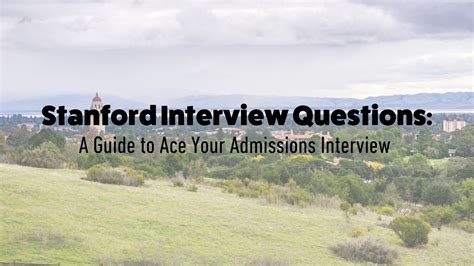Stanford University, renowned for its academic excellence and competitive admissions process, carefully evaluates prospective students through a rigorous interview. This article provides an in-depth guide to the Stanford interview questions, arming you with the knowledge and strategies necessary to showcase your strengths and make a lasting impression.

Stanford Interview Overview
The Stanford interview is a 45-minute conversation between you and a trained interviewer. It offers both parties an opportunity to engage in a meaningful dialogue and assess the applicant’s fit for the university. Interviews typically focus on the following key areas:
- Academic Background: Your academic performance, interests, and aspirations.
- Personal Qualities: Your values, motivations, and life experiences.
- Contribution to Stanford: Your potential to contribute to the university community and beyond.
Frequently Asked Stanford Interview Questions
1. Tell me about yourself.
This is the most common question and your chance to introduce yourself briefly. Focus on presenting your key strengths and conveying a positive first impression.
2. Why Stanford?
Highlight your specific interest in Stanford and its unique qualities. Explain how the university’s programs and opportunities align with your academic and personal goals.
3. What makes you unique?
Share something about your background, experiences, or perspectives that sets you apart from other applicants. Emphasize your passions and what makes you a compelling candidate.
4. What are your academic interests and goals?
Discuss your current academic pursuits, future aspirations, and why you are passionate about the subjects. Share your thoughts on the importance of academic exploration and lifelong learning.
5. What are your personal qualities?
Describe your values, character traits, and motivations. Share examples of how these qualities have shaped your decisions and actions.
6. What are your extracurricular activities and interests?
Engage the interviewer with your involvement in clubs, sports, or volunteer organizations. Discuss how these activities have developed your skills, leadership abilities, and commitment to community.
7. How do you contribute to your community?
Stanford values students who are engaged and give back. Share your experiences in community service, mentorship, or other initiatives that demonstrate your positive impact.
8. What are your strengths and weaknesses?
Be honest and introspective when discussing your strengths and weaknesses. Show that you have a realistic understanding of your abilities and areas for improvement.
Strategies for Success
- Prepare Thoroughly: Research Stanford, its programs, and the interview process. Practice answering common questions and prepare a brief introduction about yourself.
- Be Authentic: Be genuine and transparent throughout the interview. Let your personality shine through and share your unique perspectives.
- Ask Thoughtful Questions: Show that you are engaged and interested by asking thoughtful questions about Stanford, the interviewer’s experience, or the admission process.
- Follow Up: After the interview, send a brief thank-you note to the interviewer expressing your appreciation and reiterating your interest in Stanford.
Understanding the Stanford Culture
Stanford is known for its collaborative and entrepreneurial spirit, with a focus on academic excellence, innovation, and community engagement. Interviews aim to assess your alignment with these values and your potential to contribute to the Stanford ecosystem.
Common Pain Points and Motivations
Pain Points:
- Intense Competition: Stanford receives a high volume of applications and has a low acceptance rate.
- Subjective Evaluation: Interviews are subjective and can vary based on the interviewer’s style and biases.
Motivations:
- Academic Prestige: Stanford offers world-class academic programs and research opportunities.
- Networking: Access to a vast network of alumni, faculty, and industry leaders.
- Entrepreneurial Spirit: The university fosters innovation and supports student startups.
Creative Ideation for New Applications
Consider these innovative ideas to position yourself as a future innovator at Stanford:
- Develop an AI-powered study planning tool: Leverage machine learning to analyze student data and create personalized study plans that optimize learning.
- Create a virtual reality platform for language learning: Immerse students in immersive language environments that accelerate language acquisition.
- Design a blockchain-based peer-review system: Enhance academic integrity and streamline the feedback process for students and professors.
Frequently Asked Questions (FAQs)
1. How should I dress for the interview?
Stanford recommends dressing professionally, but comfort and authenticity are also important.
2. Can I bring a portfolio or resume to the interview?
Yes, but be selective and only bring materials that are relevant and highlight your skills and experiences.
3. What if I’m nervous during the interview?
Take deep breaths, stay focused, and try to relax. Remember that the interviewer wants you to succeed.
4. How long after the interview will I hear back?
Stanford aims to send interview feedback within a few weeks after the interview, but the process can vary.
5. Will I be interviewed by an alumnus or a current Stanford student?
Both alumni and current students conduct Stanford interviews.
6. Can I request a specific interviewer?
No, interviewer assignments are made randomly.
7. What should I do if I make a mistake during the interview?
Acknowledge any mistakes, explain your thinking, and show how you can learn from the experience.
8. Is the interview a pass/fail process?
No, interviews are considered as part of the holistic application review process.
